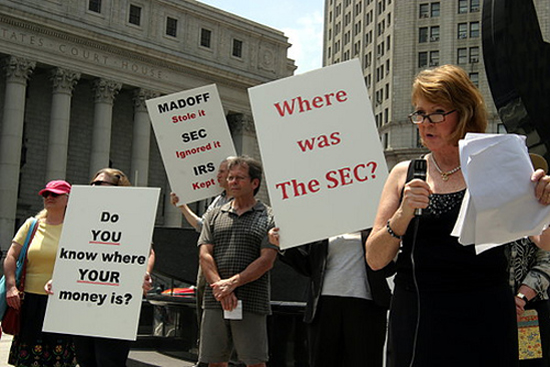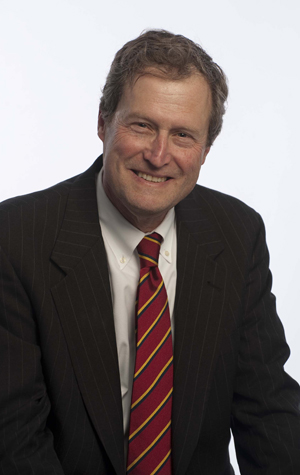When Somebody Takes What’s Rightfully Yours
International conference at BU on little-studied but vital law

The day of Bernie Madoff’s sentencing in 2009 for defrauding investors of billions, these protesters identified several targets of blame, a focus of restitution law. Photo by Flickr contributor nrv75. Kull photo by Kalman Zabarsky
“Thou shalt not steal” is about as black-letter as the law gets—just ask Bernie Madoff, the former investor sentenced to 150 years in prison for cheating investors out of billions of dollars. Legally, however, the issue of restitution is more complicated. “It is more about a question like this: Among the various defrauded investors in the Madoff Ponzi scheme, who owes what to whom, and why?” says Andrew Kull, Austin B. Fletcher Professor of Law at the School of Law and a nationally recognized expert on restitution.
Such questions define restitution law, which also covers smaller cases of unjust gain, including inadvertent ones such as bank errors on depositors’ accounts, he says. Despite this breadth of application, however, study of restitution law vanished from law school curricula in the 1960s and ’70s, adds Kull, co-organizer of a global gathering of legal luminaries to discuss the issue, in cooperation with the American Law Institute (ALI). The two-day BU LAW Restitution & Unjust Enrichment Conference starts today at the School of Law.
The 22 participants include scholars from England, Israel, Germany, South Africa, and Canada, as well as from American schools. Wendy Gordon, a William Fairfield Warren Distinguished Professor and a professor of law, and Kenneth Simons, The Honorable Frank R. Kenison Distinguished Scholar in Law, a professor of law, and LAW associate dean for faculty research, will moderate panel discussions. Ward Farnsworth, Nancy E. Barton Scholar, a professor of law, and LAW associate dean for academic affairs, is Kull’s fellow organizer. The conference is open to the public and begins at 10 a.m.

Kull (left) recently completed 15 years of work on two volumes about restitution law for the ALI, the first publication since 1937 on the topic from the Philadelphia-based legal scholarship organization of lawyers, judges, and professors. He describes the undertaking as “a huge topic” that had to be juggled with his teaching responsibilities.
Law schools bumped restitution from course work, along with other traditional teachings, “to make room for newer topics in public, statutory, and regulatory law,” Kull says. But since courts have to untangle restitution knots all the time, the results of not teaching this field have been chaotic. “Lawyers and judges have been hampered,” he says, “because it is much more difficult to deal with the issues if you are unfamiliar with the preexisting legal framework, and so don’t know where to find your problem in the library. People spend a lot of time reinventing wheels.”
Papers delivered at the conference will be published together by the Boston University Law Review.
The conference runs today, September 16, from 10 a.m. to 4:45 p.m., and tomorrow, September 17, from 9 a.m. to 12:15 p.m., at the BU School of Law, 765 Commonwealth Ave. It is free and open to the public.

Comments & Discussion
Boston University moderates comments to facilitate an informed, substantive, civil conversation. Abusive, profane, self-promotional, misleading, incoherent or off-topic comments will be rejected. Moderators are staffed during regular business hours (EST) and can only accept comments written in English. Statistics or facts must include a citation or a link to the citation.